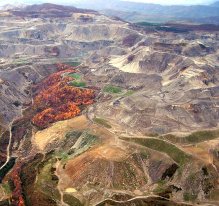Partly because fears about nuclear power persist and thanks to government support, the sector will grow strongly this year, Frost & Sullivan predicts.
The LEED-certified facility will produce 30 percent fewer CO2 emissions and significantly lower chlorofluorocarbons from its operations. Its energy consumption has been reduced by approximately $2 million annually, according to Shell's announcement.
In order to continue serving their customers with high-quality seafood, McDonald’s will begin serving Marine Stewardship Council (MSC) certified seafood, which helps protect future fish supplies, in all of its locations across the U.S.
Since the adoption of the Kyoto protocol and the growing consciousness of “renewable energies”, more European countries are beginning to provide public incentives on photovoltaic systems. During the past few years, solar applications in Italy have seen a dramatic increase in sales and usage. Since the construction of one of the largest photovoltaic roofing systems in Italy, perimeter security of the area became a large concern.
According to a new study, climate change can cause soils to reach higher temperatures, which could make those soils release additional carbon into the atmosphere.

Molds are commonly found in homes and commercial buildings, and if left untreated can cause health problems to those that are exposed to them.
Today, the U.S. Green Building Council (USGBC) released its annual list of the top states for new LEED certifications in 2012. According to the results, Texas ranks No. 10.
A new catalytic converter, known to drastically reduce emissions, has been released by ACAT Global.
GE and Sealed Air’s Diversey business expand their water alliance to the food and beverage industry in India.
Shorenstein Properties LLC obtains LEED Gold certification for its office park in Atlanta, Ga.
According to a recent report from Pike Research, a part of Navigant’s Energy Practice, sales of PEVs in the largest 102 cities in the U.S. will total slightly more than 1.8 million by 2020.
The EPA has announced a new voluntary clean air program, ‘PM Advance’, which will help communities continue to meet soot pollution standards, improve air quality, and protect public health.
The IEA has started a new regional technology study that helps determine the best way to make the Nordic region carbon-neutral by 2050. According to the research, around 3,000 offshore wind turbines will need to be in use in the region in order for success.
As of Jan. 24, consumers and businesses in Pennsylvania will no longer be allowed to throw away any electronic devices with their trash.
EPA won a decision at the D.C. Circuit in June 2012 allowing it to use its authority under the Clean Air Act to address climate change. With EPA Administrator Lisa Jackson leaving, how quickly will it act?
- By Christopher Ahlers, John David Baumgarten, Jared E. Schroder
"I would expect some action on ozone, some forward progress to happen on ozone, in the coming year," says Christopher Ahlers, a fellow at the Vermont Law School's Environmental and Natural Resources Law Clinic who is teaching an elective course on air pollution law and policy this semester.
Section 126 of the Clean Air Act authorizes individual states to file petitions with EPA to stop interstate air pollution, and it may be the most effective legal tool available. The question is how aggressively EPA will pursue it.
- By Christopher Ahlers, Will Bittinger
The U.S. Supreme Court's decision in Sackett v. EPA recognized that property owners have the right to immediately go to court to challenge the validity of administrative compliance orders issued by EPA under the Clean Water Act.
- By John Echeverria, Andrew Fowler

Federal judges ruled EPA exceeded its authority under the Clean Water Act in regulating the impacts of coal mining in Appalachia. EPA has appealed both cases, which could have major implications for its ability to control one of the most environmentally destructive practices in the country.
- By Patrick Parenteau, Rob Glover

After Tennessee Valley Authority was found liable for a massive coal ash spill, landowners this year will have to hire their own attorneys to press their individual claims. The larger question is whether facilities like the Kingston plant, with their inherent dangers to climate, waterways, and communities, are part of our continuing energy future.
- By Rebecca Purdom, Emily Remmel